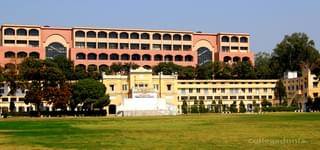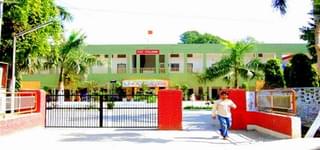B.Sc (Ag.) Latest Updates
04 Feb, 2026 AP EAPCET 2026 registartion starts on 4th Feb and the exam dates are from 12th to 20 May 2026 – Click Here
17 Jan, 2026 KEA has started the application for UG CET 2026. Apply by 17th February, 2026. Apply Here.
03 Jan, 2026 SAAT 2026, the 17th edition of this entrance test, will be conducted in online format. Check Here
03 Jan, 2026 Karnataka UGCET Exam Dates released. Kannada Language Test on April 22. Check Dates Here
24 Dec, 2025 The AP EAPCET Exam dates have been released. AP EAPCET starts from 12th May (Eng) and 19th May (Agric and Pharmacy). Check here.
BSc Computer Science and BSc Agriculture are undergraduate programs that equip students with the knowledge and skills to embark on the fields of technology and agriculture, respectively.
BSc Computer Science focuses mainly on computer science, computer applications, and their services. Whereas, BSc Agriculture mainly focuses on agricultural scientific research and practice, including subjects such as Soil science, Plant Pathology, Genetics and Plant Breeding, Agricultural Microbiology, and others.
See Also:
The admission into BSc Computer Science and BSc Agriculture is similar. Admission into both programs is either merit-based or entrance exam based. For BSc Computer Science widely accepted entrance exam is CUET. And for BSc Agriculture some of the common entrance exams are SAAT and ICAR AIEEA.
See Also:
BSc Computer Science deals with subjects like C++ Programming, Computer Organization Principles, Database Management Systems, etc. Whereas in BSc Agriculture, one has to study Livestock and Poultry Management, Introduction to Soil and Water Conservation, Farm Machinery, and so on.
Check Also:
Both courses have a lot of scope in the future. BSc Computer Science graduates can pursue higher studies in courses such as MCA, MSc Computer Science, MSc IT, etc. Whereas BSc Agriculture graduates can explore courses like MSc Agriculture, MSc Horticulture, etc.
BSc Computer Science graduates can work as Software Engineer, Website Developers, Mobile App Developers, and many other IT-related roles. BSc Agriculture graduates can be hired as Agriculture Officers, Assistant Plantation Managers, Agricultural Research Scientists, and other similar roles.
Table of Contents
- BSc Computer Science vs BSc Agriculture: Overview
- BSc Computer Science vs BSc Agriculture: Admission Process
- BSc Computer Science vs BSc Agriculture: Subjects
- BSc Computer Science vs BSc Agriculture: Scope
BSc Computer Science vs BSc Agriculture: Overview
| Parameter | BSc Computer Science | BSc Agriculture |
|---|---|---|
| Field of study | Computer Science | Agriculture |
| Duration | 3 years | 4 years |
| Eligibility | 50% marks in class 12 in Science |
|
| Subjects | Programming, Algorithms, Data Structures, and Database Management | Crop Science, Soil Science, Plant Physiology, and Agricultural Economics |
| Fees | INR 3-5 Lakhs | INR 2-3 Lakhs |
| Job Opportunity | Data Scientist, Software Developer, Web Developer, and Network Administrator | Farm Manager, Agronomist, Agricultural Consultant, Plant Breeder |
| Salary | INR 6-7 Lakhs | INR 4-5 Lakhs |
| Top Recruiters | HCL, Google, Deloitte, Facebook, Central Government Organizations, IBM | DuPont India, Rallies India Limited, Advanta Limited, National Agro Industries, Rasi Seeds, ABT Industries. |
BSc Computer Science vs BSc Agriculture: Admission Process
Admission to the BSc Computer Science program can be obtained through merit or through an entrance exam. A candidate must score at least 50% marks in class 12 in Science. A candidate with a three-year diploma in a technical subject who has completed Class 10 can also apply. Admission to top universities for BSc in Computer Science 2023 is done through an entrance exam like CUET.
See Also:
Admission to the BSc Agriculture 2023 program is dependent on merit or an admission entrance exam. A candidate must have completed his or her 10+2 with Science with at least 50% marks. Candidates can apply for admission to the BSc Agriculture Course by taking any state-level or university-level entrance exam. Some of the BSc Agriculture entrance exams are SAAT, ICAR AIEEA, and CGPET.
BSc Computer Science vs BSc Agriculture: Subjects
BSc Computer Science and BSc Agriculture are two different fields.
Check Also:
Both programs have different subjects. These subjects are listed below.
| BSc Computer Science Subjects | BSc Agriculture Subjects |
|---|---|
| C++ Programming | Livestock and Poultry Management |
| Computer Organization Principles | Introduction to Soil and Water Conservation |
| Database Management Systems | Farm Machinery and Power |
| Introduction to Embedded Systems | Livestock and Poultry Management |
| Fundamentals of PHP | Principles of Food Science and Nutrition |
| Mathematical Foundation For Computer Science | Principles of Organic Farming |
| Java Programming | Importance of Manures Fertilizers and Soil Fertility |
| Functions | Principles of Agribusiness |
| Arrays | Farming System and Sustainable Agriculture |
| Disk Operating System | Fundamentals of Horticulture, Microbiology, Agriculture, Plant Pathology, Life Sciences |
| Introduction to Number system and codes | Advantages of Organic Production |
| Data Mining | - |
| Software Engineering | - |
| Computer Networks | - |
| Control Structures | - |
BSc Computer Science vs BSc Agriculture: Scope
BSc Computer Science equips students with the knowledge to explore the vast digital landscape, while BSc Agriculture offers insights into the intricacies of nurturing the land and its resources for a sustainable future.
See Also:
BSc Computer Science Scope
- BSc Computer Science graduates can pursue careers as software developers, data analysts, cybersecurity specialists, and artificial intelligence engineers, among others.
- After completing BSc Computer Science, students can opt for advanced courses like machine learning, cloud computing, blockchain technology, and data science.
- BSc Computer Science offers exciting opportunities to study abroad, enabling students to gain a global perspective and access cutting-edge research facilities in renowned universities worldwide.
- BSc Computer Science graduates can dive into research and innovation, contributing to advancements in areas such as robotics, virtual reality, natural language processing, and bioinformatics.
See Also:
BSc Agriculture Scope
- BSc Agriculture opens doors to various job opportunities such as agricultural officer, farm manager, agricultural economist, agronomist, or plant breeder.
- Graduates can pursue advanced courses such as agricultural biotechnology, precision farming, organic farming, agricultural engineering, or agricultural marketing.
- BSc Agriculture provides a foundation for aspiring entrepreneurs to start their ventures in agribusiness, organic farming, value-added food processing, and agricultural consulting.
- BSc Agriculture graduates can engage in research and development, working on projects related to crop improvement, soil science, pest management, sustainable agriculture, or agricultural policy, contributing to scientific advancements.
See Also:
BSc Computer Science vs BSc Agriculture: Future Courses
Here is the list of courses that a BSc Computer Science or BSc Agriculture graduate can pursue after their graduation-
| BSc Computer Science | BSc Agriculture |
|---|---|
| MBA | MSc Horticulture |
| MSc IT | MBA in Agribusiness |
| MSc Computer Science | Master in Agricultural Engineering |
| MCA | Master in Agronomy |
| Master in Computer Management | MSc in Agriculture |
| CISCO Certificate | MSc Agric in Genetics |
| MIS | MSc in Agricultural Economics |
Check Also: BSc Agriculture Distance Education
BSc Computer Science vs BSc Agriculture: Jobs
BSc Computer Science offers diverse career opportunities in the dynamic world of technology, while BSc Agriculture provides a range of prospects within the agricultural sector, contributing to food production, sustainability, and rural development.
See Also:
Some of the jobs in both fields are listed below.
| BSc Computer Science Jobs | Average Salary | BSc Agriculture Jobs | Average Salary |
|---|---|---|---|
| Software Engineer | INR 5.10 LPA | Agriculture Officer | INR 9.60 LPA |
| Website Developer | INR 3.07 LPA | Assistant Plantation Manager | INR 5.25 LPA |
| Mobile App Developer | INR 4.41 LPA | Agricultural Research Scientist | INR 6 LPA |
| UI/UX Developer | INR 4.92 LPA | Agriculture Development Officer | INR 4.80 LPA |
| IT Supervisor | INR 3.73 LPA | Agriculture Technician | INR 3.5 LPA |
| Network Engineer | INR 3.13 LPA | Marketing Executive | INR 3.46 LPA |
| Technical Writer | INR 4.89 LPA | Plant Breeder | INR 7.76 LPA |
| Software Quality Assurance (SQA) Tester | INR 3.35 LPA | Seed Technologist | INR 3.25 LPA |
BSc Computer Science vs BSc Agriculture: FAQs
Ques. What are some of the subjects included in the BSc Computer Science curriculum?
Ans. Some of the most common subjects included in the BSc Computer Science curriculum are Basics of Computer Science, System Programming, Python Programming, Object-Oriented Programming using C++, Discrete Mathematics, Introduction to Data Structures
Ques. What kinds of jobs are available after getting a BSc in Agriculture?
Ans. After completing a BSc Agriculture, a student can pursue a variety of positions such as agricultural officer, research analyst, associate manager, agricultural manager, and so on.
Ques. What are some of the subjects covered in the BSc Computer Science program?
Ans. Artificial intelligence, computer systems and networks, security, database systems, human-computer interaction, vision and graphics, numerical analysis, programming languages, software engineering, bioinformatics, and theory of computing are some of the major areas of study within Computer Science.
Ques. Is maths required for the BSc Computer Science?
Ans. Maths is usually considered a necessary subject in Class 12 to pursue this course since it makes it easier for students to pursue this score.
Ques. What employment is available after completing a BSc in Computer Science?
Ans. Some of the careers available after completing this course include IT Analyst, Software Developer, Network Engineer, System Engineer, Computer Operator, Technical Assistant, Technical Engineer, Technical Writer, and so on.
Ques. What industries can a BSc Computer Science graduate work in?
Ans. Graduates with a BSc in Computer Science can find work in a variety of industries, including technology, finance, healthcare, education, and government organizations.
Ques. What jobs are available for BSc Computer Science graduates?
Ans. After completing the BSc Computer Science course, students may be able to get employment as an IT analyst, software developer, network engineer, system engineer, computer operator, technical assistant, technical engineer, technical writer, etc. in the fields of computer science and programming.
Ques. What is the eligibility for the BSc Agriculture?
Ans. To pursue BSc Agriculture, students must have a minimum of 50% in Physics, Chemistry, and Biology in Class 12. Some colleges additionally make English a required course.
Ques. What is the average BSc Agriculture salary?
Ans. In entry-level positions, students may expect to earn roughly INR 15,000-30,000 after completing BSc Agriculture. After gaining experience students can earn anywhere between INR 3-8 LPA. If you work in the government sector, your salary package and compensation will be higher.
Ques. Who are the top employers for a BSc in computer science?
Ans. Top recruiters of BSc Computer Science include Microsoft, IBM, Oracle, Cisco, Intel, Apple, Nvidia, Wipro, Infosys, Accenture, and others.



![Siksha 'O' Anusandhan University - [SOA]](https://image-static.collegedunia.com/public/college_data/images/appImage/1737985425Screenshot20250127191243.png?h=150&w=320&mode=stretch)
![Roorkee Institute of Technology - [RIT]](https://image-static.collegedunia.com/public/college_data/images/appImage/1707201237CDCoverPage11.jpg?h=150&w=320&mode=stretch)



![Mangalayatan University - [MU]](https://image-static.collegedunia.com/public/college_data/images/appImage/1587063265bld.png?h=150&w=320&mode=stretch)
![Deen Dayal Upadhyaya Gorakhpur University - [DDU]](https://image-static.collegedunia.com/public/college_data/images/appImage/1505106168cover.jpg?h=150&w=320&mode=stretch)
![Chhatrapati Shahu Ji Maharaj University - [CSJMU]](https://image-static.collegedunia.com/public/college_data/images/appImage/25931_CSJMU_New.jpg?h=150&w=320&mode=stretch)

Comments